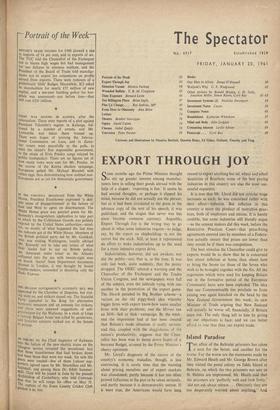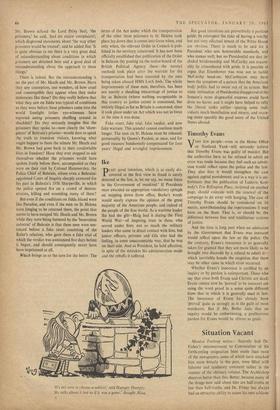Island Paradise
THE affair of the Bahraini prisoners has taken a turn for the better, and another for the worse. For the worse are the statements made by Mr. Edward Heath and Mr. George Brown after they visited the penal colony on Jidda Island at Bahrain, on which the two prisoners not sent to St. Helena are imprisoned. Mr. Heath said that the prisoners are 'perfectly well and look lively,' 'did not ask about release . Obviously they are not desperately worried about anything.' And Mr. Brown echoed the Lord Privy Seal; 'the prisoners,' he said, 'had no major complaints'; which disproved statements about 'the way other prisoners would be treated'; and he added that 'It is quite obvious to me there is a very great deal of misunderstanding about conditions in which prisoners are detained here and a good deal of misunderstanding about the approach to these things.'
There is indeed. But the misunderstanding is on the part of Mr. Heath and Mr. Brown. Have they any conception, one wonders, of how cruel and contemptible they appear when they make statements like these? Do they really believe that what they saw on Jidda was typical of conditions as they were before these prisoners came into the world limelight (other eye-witnesses have reported seeing prisoners shuffling around in shackles)? Do they seriously imagine that the prisoners they spoke to—now clearly the 'show- pieces' of Bahrain's prisons—would dare to speak the truth to transient visitors, knowing what might happen to them the minute Mr. Heath and Mr. Brown had gone back to their comfortable lives in freedom? Have they ever stopped to ask' themselves whether the prisoners would have spoken freely before them, accompanied as they were on their visit by Colonel Hammersley, the Police Chief of Bahrain, whom even a Bahraini- appointed Court of. Inquiry sharply censured for his part in Bahrain's 1956 Sharpeville, in which the police opened tire on a crowd of demon- strators, killing and wounding many of them?
But even if the conditions on Jidda Island were like Paradise, and even if the men on St. Helena were longing to be returned there, the point that seems to have escaped Mr. Heath and Mr. Brown while they were being buttered by the `benevolent autocrat' of Bahrain is that these men were sen- tenced before a fake court consisting of the Ruler's relatives, who gave them a fake trial of which the verdict was announced five days before it began, and should consequently never have been imprisoned at all.
Which brings us to the turn for the better. The 'It's my turn to choose a subject,' said 11 umpty Damply. 'He talks about it just as if it was a game,' thought Alice.
terms of the Act under which the transportation of the other three prisoners to St. Helena took place lay down that it comes into force when, and only when, the relevant Order in Council is pub- lished in the territory concerned. It has now been officially established that publication of the Order in Bahrain (by posting on the notice-board of the British Political Agency there—the normal method) took place after the warrant for the transportation had been executed by the men being taken aboard HMS Loch lnsh. The whole imprisonment of these men, therefore, has been not merely a shocking miscarriage of justice as far as Bahrain (where nothing recognisable in this country as justice exists) is concerned, but entirely illegal as far as Britain is concerned, since it took place under an Act which was not in force at the time it was done.
Fake court, fake trial, fake verdict, and now fake warrant. This scandal cannot continue much longer. The men on St. Helena must be released, presumably by Queen's Pardon, at once, and for good measure handsomely compensated for four years' illegal and wrongful imprisonment.



































 Previous page
Previous page